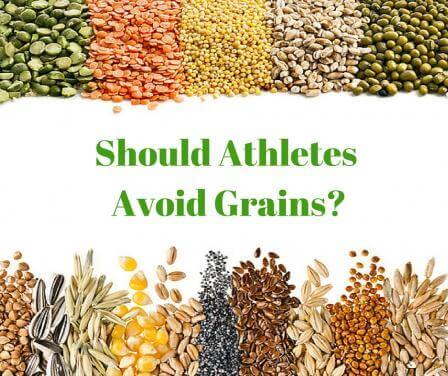Should Athletes Avoid Grains?
Will eating grains cause you to pack on body fat? The answer, as always, depends on the context. Nutrition Diva explains.
Monica Reinagel, MS, LD/N, CNS
Listen
Should Athletes Avoid Grains?
Hype writes: “I’m an athlete and coach who trains 2-3 sessions per day and participate in both sprint and endurance sports. I mainly follow a grain-free diet because I heard that grains can pack on fat. The problem is that I am always hungry. I eat lean protein, veggies, and about 6-10 servings of fruit per day. But even when I eat the number of calories I’m supposed to have, I am just having a hard time feeling full without grains. Do grains have some kind of special properties that make you feel full? Could I add some grains without gaining fat?”

Does Eating Grains Cause Fat Gain?
Whenever I hear someone say “Eating grains causes you to gain fat,” I’m always waiting for the second half of the sentence—because without that, the statement makes no sense.
For example:
“Eating grains will cause you to gain fat … if it leads you to eat too many calories.”
or
“Eating grains will cause you to gain fat … if it leads to chronically high blood sugar.”
But all by itself, the blanket assertion that grains lead to fat gain is ridiculous. There is nothing about the calories or the carbohydrates in a grain that pre-destine it to be converted into body fat. Context is everything.
See also: Are Some Calories More Fattening Than Others?
Who Should Fear Grains?
If you are sedentary, overweight, and pre-diabetic, grain-based foods may indeed be contributing to fat gain (or worse). Limiting your consumption of grain-based foods—especially those made with refined grains—is probably one of the quickest ways to improve your health.
See also: Advantages of Limited Refined Carbohydrates
But I don’t think anyone who is training 2-3 sessions a day needs to worry about consuming a moderate amount of whole grain foods. In fact, there are several ways in which grains may be particularly useful for athletes.
- Grains can help you meet your increased calorie needs. Athletes who are training hard need to eat a lot of calories to replace what they burn. (Remember those 10,000 calorie breakfasts that Michael Phelps was eating during the Olympics?)
- Whole grains are filling. Both whole grains and legumes contain more fiber than most kinds of fruit, which can help keep hunger at bay. These indigestible fibers also provide food for the beneficial bacteria in the gut, which have all kinds of important functions—including regulating appetite and body weight.
- A moderate carbohydrate diet preserves metabolic flexibility. A couple of weeks ago, I talked about the recent trend of extremely low carb diets for athletes. Although it is possible for athletes to adapt to a very low carb diet, they often lose their ability to burn carbohydrates for fuel. The ability to efficiently switch back and forth between fat and carbohydrate as a fuel source is usually a big advantage—especially for someone who is pursuing both sprint and endurance sports.
And it’s pretty hard to get two or three thousand calories a day from nothing but lean protein and vegetables. In fact, in order to meet her calorie needs without taking in any grains, Hype has resorted to eating massive quantities of fruit. Another option would be to replace some of that fruit with whole grains and/or legumes and perhaps a little healthy fat!
When you eat a greater variety of whole foods, you also get a broader variety of nutrients.
See also: How Important Is a Varied Diet?
See also: 3 Tips on How to Eat Less Without Feeling Hungry
And here’s some good news for those of you with gluten intolerance: buckwheat and quinoa (both of which are gluten free) may keep you feeling satisfied even longer than wheat.
See also: Nutrition Diva’s Guide to Grains
You don’t have to consume grains in order to get carbohydrates, of course. You can also get carbs from legumes, fruits, and starchy vegetables like corn or sweet potatoes.
See also: What Nutrients Would You Miss By Cutting Out Grains?
Grains Are Not Essential
As I’ve said before, I don’t think grains are essential to a healthy diet. I’ve also said that grain-based foods are a common source of excess calories—especially for those of us with more sedentary lives. Or those of us who find ourselves unable to walk by the fresh baked pretzel store at the mall without stopping for one.
But I’m pretty confident that serious athletes can enjoy a few servings of whole grains if they want to, without worrying about packing on body fat.
References:
Berti C, Riso P, Brusamolino A, Porrini M. Effect on appetite control of minor cereal and pseudocereal products. Br J Nutr. 2005 Nov;94(5):850-8.
Cooper, D.N.; Martin, R.J.; Keim, N.L. Does Whole Grain Consumption Alter Gut Microbiota and Satiety? Healthcare 2015, 3, 364-392.

